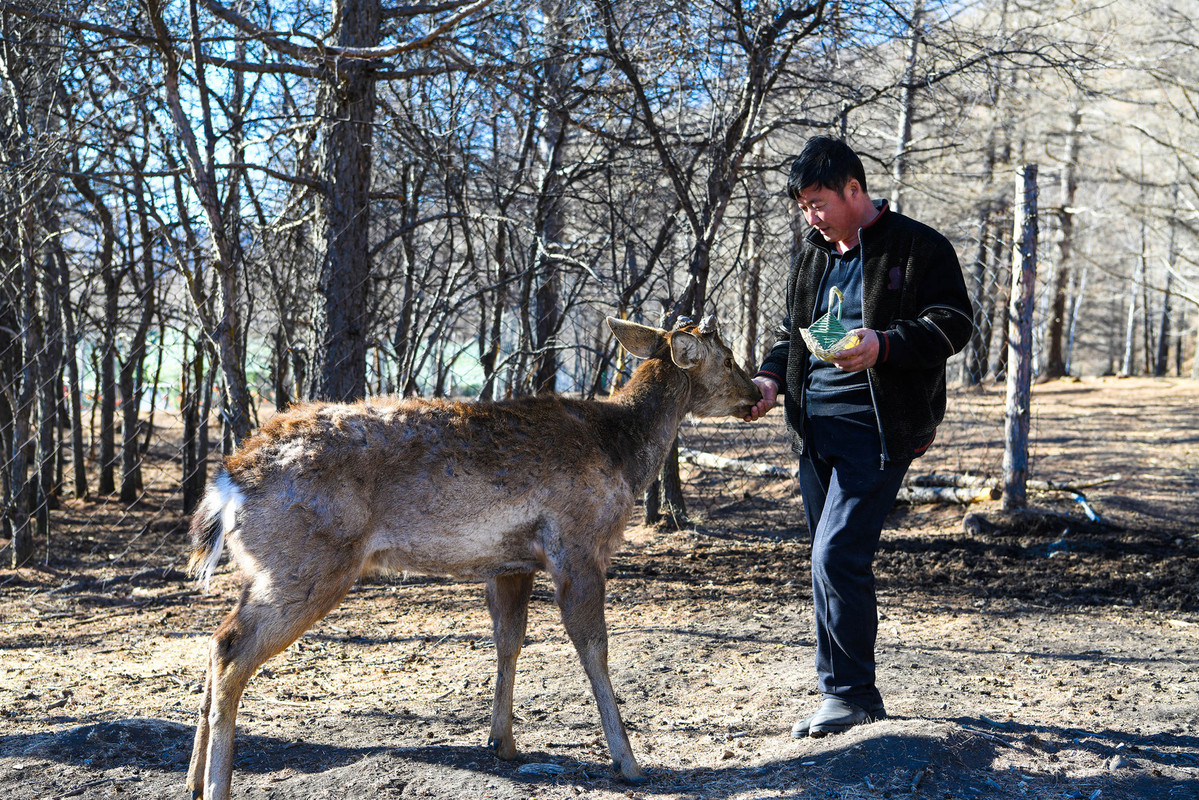
From the People's Daily App.
This is Story in the Story.
The lumber industry was once the pillar of Arxan, a county in the Inner Mongolia autonomous region, where it was common for two and even three generations of local families to be involved in the sector.
The country is now promoting environmental protection, so logging was banned in 2012. However, instead of damaging the local economy, the ban has opened a new chapter for green development.
In addition to tourism, the city has gained fresh development impetus from animal husbandry and eco- industries.
The new development mode, which has protection of the rich forest resources at its core, has helped Arxan shed its status as a national poverty-stricken area, making it a successful example of the maxim that "lucid waters and lush mountains are valuable assets."
Yu Jiujiang, a resident of Arxan's Bailang township, is one of those who put away his logging tools and benefited from the development of local tourism.
Yu followed in his father's footsteps as a lumberman after graduating from junior high school in 1982. The tough times felling trees day after day are unforgettable. "We left home for work before dawn and it was dark when we returned," the 57-year-old recalled.
Today’s Story in the Story looks at how Arxan residents' annual per capita disposable income has risen at an average of 9 percent a year since logging was banned.

A birch forest turns golden in fall in Arxan, North China's Inner Mongolia autonomous region. (Photo: chinadaily.com.cn)
The logging quota became smaller as 2012 approached, so local authorities encouraged forest farm workers to start their own businesses.
Yu seized the opportunity and opened a stable to serve tourists, mainly during winter, when Bailang is covered by snow. In addition to horseback riding, he provides horse-drawn sled tours to entertain visitors.
He never expected his venture would be such a success. Initially, Yu had about 100 customers a day during winter, but after president Xi Jinping's visit in 2014, the number soared to 500 to 600. "There were so many customers that I was once even called out to work when I was enjoying (Chinese) New Year's Eve dinner," he recalled.
Now, he hires at least five poverty-stricken residents if he and his family members are too busy to work at the stables.
"My family can make up to 20,000 yuan ($2,830) a year," Yu said.
Ren Hongmei, a Bailang resident and former lumberwoman, runs several businesses, thanks to rising tourist numbers.
In 2003, Ren's family was one of 40 households who moved into a newly established deer village to raise the animals. Together, they run at least five businesses.
While planting jelly ear, a type of edible fungus, and tree seedlings for sale, Ren also runs a 14-bedroom rural resort that can accommodate up to 40 people, plus a shop that sells local specialties such as powdered deer antler, a popular traditional Chinese medicine, jelly ear and wild mushrooms.

A tourist feeds a deer in Bailang township, Inner Mongolia autonomous region, in April. (Photo: Xinhua)
She and her family invested 800,000 yuan in the resort in 2014, more than 60 percent of which came from a zero-interest loan provided by the local government.
All the bedrooms in her resort are booked for a minimum of 10 days during summer and the establishment is also full during celebrations, such as the seven-day National Day Holiday, which starts on Oct 1 every year.
"Life has improved a lot," she said.
Zheng Xiaolin, the village head, said his deer farm attracted more than 20,000 tourists last winter. He hires up to 16 residents from poverty-stricken families to help care for his 100-plus deer and serve the tourists, who can interact with the gentle animals and buy food, such as corn, to feed them.
The farm charges an admission fee of 50 yuan per adult during the peak winter season and 30 yuan at all other times. The business generates annual revenue of 100,000 to 200,000 yuan, Zheng said.
"I was once a poorly-paid lumberman, just like the other residents. After logging was banned, many people chose to make a living as migrant workers in urban areas. However, the tourism boom has seen many people return, and some have become managers at resorts and other businesses," he said.
"The practices in Arxan fully illustrate that there can be positive interaction between environmental protection and socioeconomic development, and a good environment can provide a foundation for economic development," said Han Yongwei, a researcher with the Chinese Research Academy of Environmental Sciences.
(Produced by Nancy Yan Xu, Brian Lowe, Lance Crayon and Paris Yelu Xu. Music by: bensound.com. Text from China Daily.)


